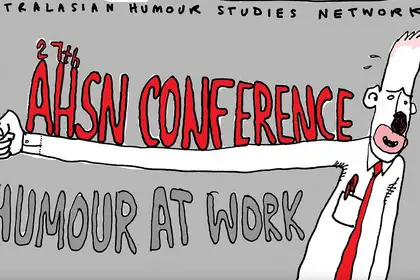
The topic of humour is explored from a range of academic perspectives at this week's conference.
The economics of the comedy industry, humour in lockdown, and understanding what kind of jokes are OK at work are all topics under serious consideration by scholars attending a conference on humour at Massey University’s Wellington campus this week.
The theme of the 27th Conference of the Australasian Humour Studies Network (February 3-5) is Humour at Work: Applications, Industries and Economies. With both in-person and online sessions, the event brings together a diverse range of academics in business and management, languages, sociolinguistics and media studies from Aotearoa, Australia and Canada, says convener Dr Nicholas Holm. He is a senior lecturer in Media Studies in the School of Humanities, Media and Creative Communication, and specialises in the study of humour in politics.
Humour scholars are sharing research findings on a gamut of fascinating and funny themes, ideas and micro-genres, including; the humour of sports commentators; how humour can exclude people in the work place; combatting boredom from technology over-use; migrant experiences of misinterpreting humour in the office; and expressing national identity through humour.
Dr Holm says participants will consider “the different ways humour can be thought to have either sold out or cashed up. How has humour been implicated in a wide range of business practices and cultures? How has humour been put to work to earn its keep? What changes have arisen from the increasing professionalisation of comedy? How might humour be implicated or understood in light of our wider economic context?”

Conference convenor Dr Nicholas Holm
Laughter in lockdown
Keynote presenters are; Dr Barbara Plester (Senior Lecturer of Management, University of Auckland), speaking at the event in Wellington, and Dr Christelle Pare (Head of Research and Development, Just for Laughs/Juste pour Rire), presenting online.
In her talk: Context, complexity and Covid-19: Workplace humour in troubled times, Dr Plester draws on examples from participants’ lockdown experiences as well as seventeen years of workplace humour research.
She says the adage; “May you live in interesting times” (thought to be an ironic Chinese quote or curse), is; “pertinent to our current global situation and our recent lived experiences in the tumultuous year that was 2020.
“Humour may have sustained many of us through such worrying, anxious days and workplace humour seems particularly relevant, interesting and changeable when in the grips of a global pandemic - especially now many of us are regularly working from home,” she says.
“Workplace humour is complex with additional layers of complexity added as we try to joke over Zoom, FaceTime and email in order to maintain our ‘good humour’ and fun in our work lives. Although electronic communications can be less favourable for humour exchanges, humour is still a popular coping mechanism and essential for our psychological well-being in our rapidly changing workplaces.”
Funny money
Dr Pare will present via Zoom from Montreal on the economics of the comedy business in her talk: Comedy Festivals in the 21st Century: More Essential than We Thought (A Year Ago).
Humour, she notes, is big business, “although often imagined to be aligned with the leisurely or the everyday—something to be pursued for its own sake and own pleasures.”
“Whether understood in terms of the international comedy industry, the role of humour in corporate contexts, or its instrumentalist application in a range of industries and activities, humour can be alternately lucrative or costly. Moreover, comedy is not just profitable, but also often shaped by profits as new technologies, institutions and economies change the way we laugh.
“From the rise of the Netflix stand-up comedy special to the advent of a new breed of online celebrity-comedians, shifts in political economy have had consequences not just for where and when we consume comedy, but also for the types of humour that circulate and which of them can find an audience.”
Presentations from Massey University academics include; Spanish language senior lecturer Dr Celina Bortolotto on an Argentinian social media sensation Gente Rota (Broken People) based on a series of animated videos created from WhatsApp audio; Interactive Media lecturer Tristan Bunn on how comic books serve as cathartic outlets for their creators; and Media Studies lecturer Dr Kyra Clarke on humour and ambivalence in teen cinema.
The online section of the conference is being run on the basis of a model and infrastructure developed by the Massey’s Political Ecology Research Centre – which has hosted several online conferences in the past few years – with the option for participants to return regularly to the conference website over the week to view new content and participate in panel discussions.
For information on the conference (live and online): https://ahsn.org.au/events/
An art exhibition with a humour theme will be launched in tandem with the conference. Curated by Bryce Galloway, a senior lecturer in the School of Art in the College of Creative Arts, and titled The Stories of Five to Ten People: Funny Art, it takes place at The Engine Room gallery at Massey’s Wellington campus and runs through February. The show brings together 12 New Zealand artists who make work with a marked sense of humour.